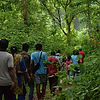

മുഹമ്മയില് നിന്നും ആദ്യ സിന്തെടിക് സാനിട്ടറി പാട് രഹിത ഗ്രാമത്തിലേക്ക്...
കാലാവസ്ഥാ വ്യതിയാനവും അനുബന്ധ ദുരന്തങ്ങളും തുടര്ക്കഥയായി മാറുന്ന ഈ കാലഘട്ടത്തില് നമ്മുടെ ദൈനംദിന ജീവിത ശൈലിയുമായി ബന്ധപ്പെട്ട പല...


Major problems faced by the women run enterprises in Kerala
The author, Roshna George was an intern at ATREE CERC and currently Young Professional at MPSRLM The study will help in understanding the...


ജലപാഠം - നമുക്ക് പഠിക്കാം നമ്മുടെ ചുറ്റുപാടിനെ!
പഠന മുറികൾ, പുസ്തകങ്ങൾ, ഗൃഹപാഠം, പരീക്ഷകൾ..... ഇതു മാത്രമാണോ വിദ്യാഭ്യാസം എന്നത് കൊണ്ട് ഉദ്ദേശിക്കുന്നത്? അതോ ഇങ്ങനെ മാത്രമേ അറിവ്...


A study of East Kolkata Wetlands
The East Kolkata Wetlands is one of the largest human made wetland which caters to the ecosystem service of managing sewage water of the...

_flavin.png)












